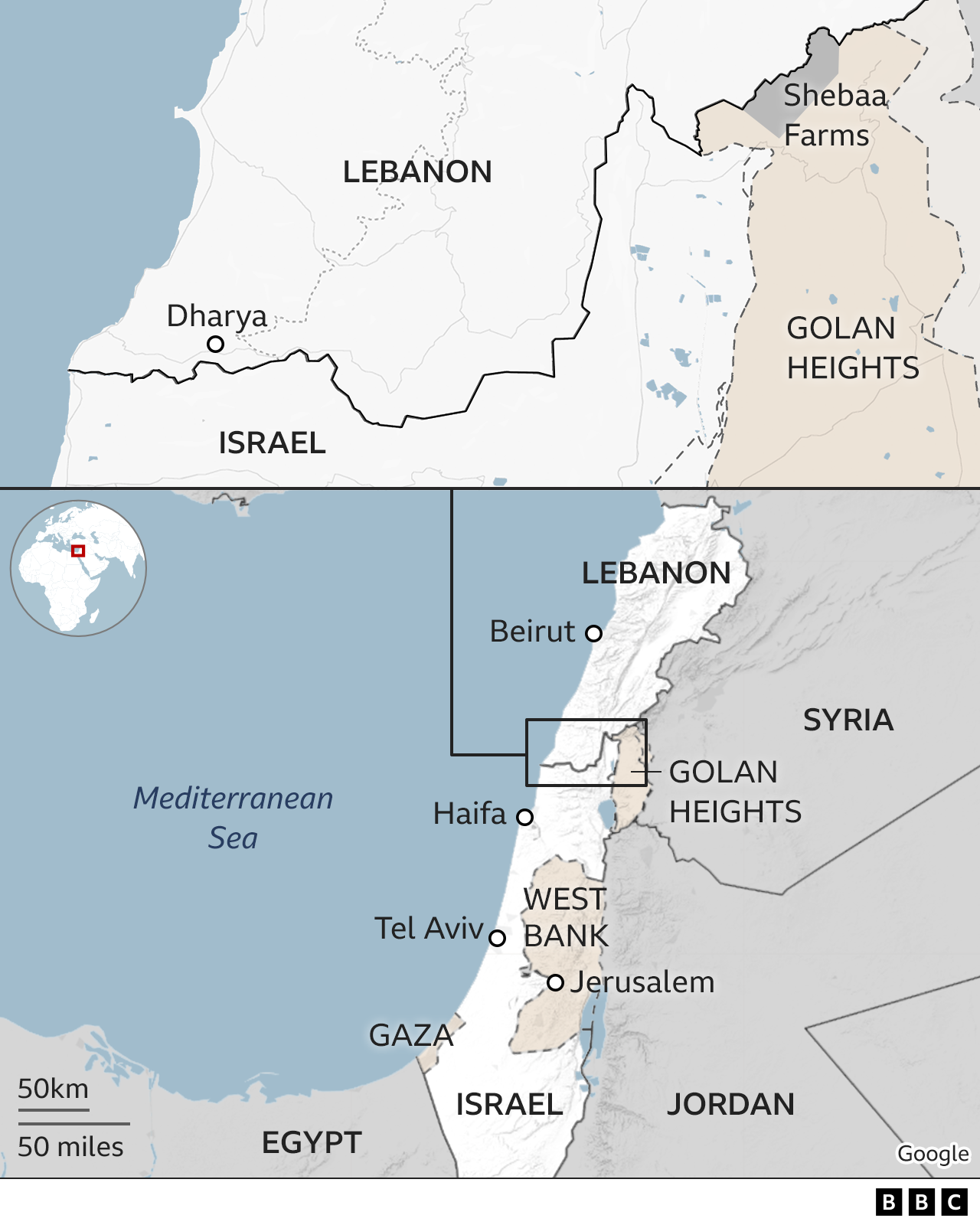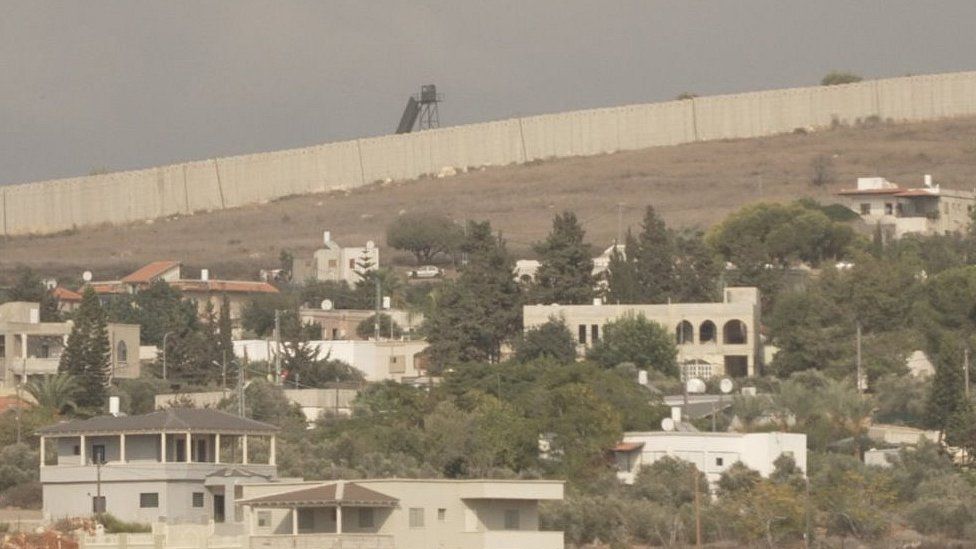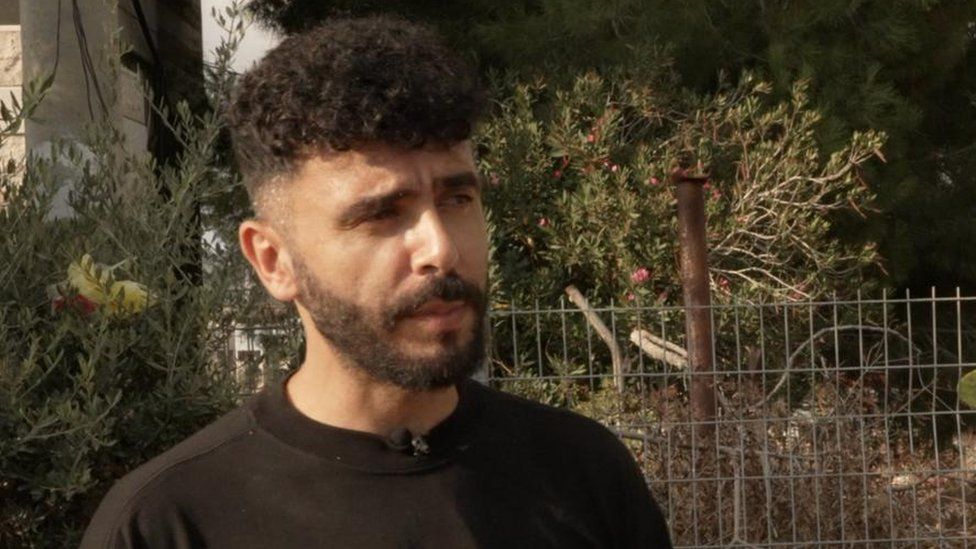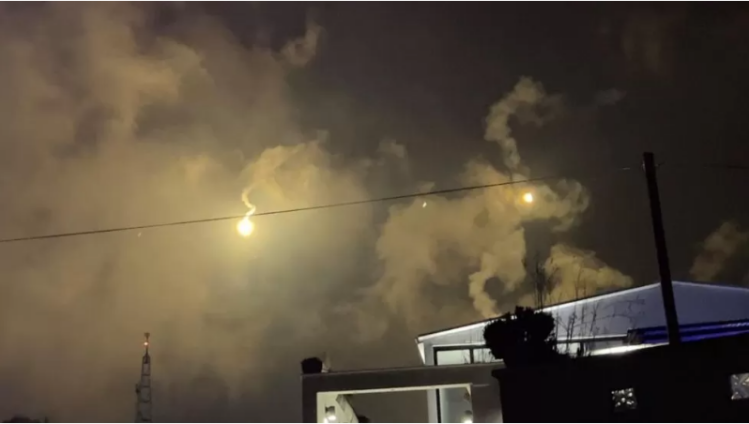The sound of the first explosion makes everyone jump. It's dark, so we can't see the flares that are starting to fire into the night sky. But we can hear them - first a loud boom, then a long screech as they power out of one country's sky and into another.
The nervousness is palpable here on Israel's northern border with Lebanon. The noise overhead has been triggered by a security alert - possible infiltrators from the north. The flares help Israeli soldiers to search for them in the darkness.
As the sirens wail, we scramble from our car into a secure shelter with a local security team. They gather around the TV news and turn up their radios tuned in to the army channels, desperate for information. Rumours say it's a drone or glider attack from the north.
This time, it turns out to be a false alarm. But over the last few days there have been several exchanges of fire. On Monday, three Israeli soldiers were killed in a confrontation with infiltrators who'd crossed over the border from Lebanon. Palestinian Islamic Jihad claimed they were its members.
Later, at least three Hezbollah militants were killed as the Israeli military attacked sites in Lebanon in response to mortar fire.

Of the 300,000 Israeli reserve soldiers being mobilised right now in response to Saturday's unprecedented attack on southern Israel by Hamas militants from Gaza, a large chunk are being sent to reinforce this northern border.
At the rendezvous points around here they're arriving all the time to report for duty. Vehicles spill out of overflowing car parks and empty coaches line the streets. In one bus stop a group of green-clad soldiers shelter from the sun, relaxing on the ground to save their energy until it's needed.
Most people you meet proudly tell you about family members who are on their way to serve. Those who aren't needed yet - like two medics we meet - explain how they're instead using their time to take supplies of food, water and extra essentials like mobile phone power banks to colleagues.
As we try to grab some food after a long day, one local takeaway is running out of ingredients after using them all to bake hundreds of pizzas to take to soldiers.
The large troop build-up is all because another, different militant group poses a significant threat here on the northern border. Hezbollah - like Hamas - has been designated a terrorist organisation by the UK, US and other countries.
Backed by Iran, it has a strong military and political presence in Lebanon, and wields considerable power in a country without a functioning government or president. In 2006, it fought a devastating war with Israel in which 1,200 people died.
For days there have been exchanges of fire across the border between Hezbollah and Israeli forces. Palestinian militant groups in Lebanon have been involved too.
All of this is dangerous. If the situation escalates and a new front opens up in this war - plunging Israel into another full-scale conflict with Lebanon - the effect would reverberate around the region.
It would have an impact further afield too, which is one of the reasons why the US in particular is helping the Israeli military, and vocally telling the world it's prepared to help Israel defend itself against all attacks.
The arrival of a first shipment of US arms in Israel and the deployment of a US aircraft carrier in the eastern Mediterranean has backed up those words with actions.

Right at the grassroots, people are doing what they can to protect themselves too. Adeeb Mazal is part of the emergency team in his northern Israeli village, which nestles right next to the imposing border wall with Lebanon.
Hezbollah observation towers are clearly visible, rising above it at regular intervals. Dressed in black and wearing sturdy boots, Adeeb describes how communities like his rely on their own armed security squads to protect them from potential attacks.
"We have a very small group of volunteer men," he tells me. "I think we need at least 20 people - because we are on the border - but we are only five.
"We ask all the time for more people and more weapons, we can't defend the village like this. We're hoping the authorities will give us as many as 30 men."

Adeeb also talks about a time when this village didn't have a border running through it. "These organisations do not distinguish between Jews and Arabs," he says. "We are Arabs, we have a mosque, and they continue to harm the village."
The day before we met, Adeeb's team had sprung into action.
"There was an infiltration of some terrorists from Lebanon and we had to go to the shelters, all of the residents," he said.
We and the army went to a defence post, there were some shootings and wounded on our side. We are now trying to keep to a regular life, but we're asking people always to be close to a bomb shelter."
Latest Stories
-
Kobina Ansah’s ‘The Saint In The Devil’s Shoes’ shows On Good Friday and Holy Saturday
9 minutes -
Majority of Ghanaians support Chief Justice’s removal – Report
17 minutes -
Two-state solution or never-ending war? Palestinian Authority calls for immediate UN action
34 minutes -
I am committed to improving standard of education – Hohoe MP
50 minutes -
We did not play football – Hearts coach Ouattara rips into his team following Aduana defeat
1 hour -
Shining the light on haemophilia and bleeding disorders in women and girls
1 hour -
Producer price inflation for March eases to 24.4%
1 hour -
We were undone by counter attacks – Ogum reflects on Kotoko’s heaviest defeat of the season
1 hour -
MobileMoney LTD refutes claims of system breach following social media allegation
2 hours -
VRA assures Ghanaians of sustainable power production
2 hours -
Ghana unveils ambitious downstream agenda at Invest in African Energies: Accra Investor Briefing
2 hours -
Global Environment Facility completes key training to improve project oversight among operational focal points in West Africa
2 hours -
PSGH awards Aide Chemists as Best Online Pharmacy in Ghana, acknowledges its flagship health app, Momentum
2 hours -
Ghana losing millions of dollars through smuggling of Coca-Cola products – MD discloses
2 hours -
Implementation committee inaugurated for establishment of Kumawu Nursing and Midwifery College
3 hours

